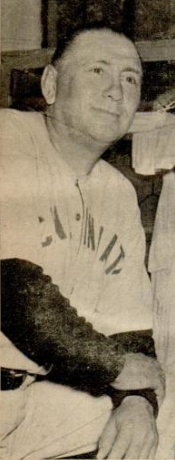Johnny Neun
| Johnny Neun | |||
|---|---|---|---|

Johnny Neun in 1948
|
|||
| First baseman | |||
|
Born: October 28, 1900 Baltimore, Maryland |
|||
|
Died: March 28, 1990 (aged 89) Baltimore, Maryland |
|||
|
|||
| MLB debut | |||
| April 14, 1925, for the Detroit Tigers | |||
| Last MLB appearance | |||
| September 27, 1931, for the Boston Braves | |||
| MLB statistics | |||
| Batting average | .289 | ||
| Stolen bases | 41 | ||
| Runs | 171 | ||
| Teams | |||
|
As Player As Manager |
|||
| Career highlights and awards | |||
|
|||
As Player
As Manager
John Henry Neun (October 28, 1900 – March 28, 1990) was an American first baseman for the Detroit Tigers and the Boston Braves from 1925 to 1931.
Although never an everyday player (he never played more than 97 games a season), Neun entered baseball immortality on May 31, 1927 against the Cleveland Indians, when he caught a line drive from Homer Summa, stepped on first to retire Charlie Jamieson, and despite shouts from his shortstop to throw him the ball, raced towards second base to retire Glenn Myatt, completing the seventh unassisted triple play in MLB history, and the first such play to end a game. Neun turned the triple play as a first baseman and not a second baseman or shortstop, one day after Jimmy Cooney of the Chicago Cubs had done so.
On July 9, 1927, playing against the New York Yankees, Neun had five base hits and five stolen bases. He is the only player since at least 1914 to have at least five of each in one game. Nevertheless, he stole only 41 bases in his career.
A switch-hitter who threw left-handed, Neun batted .289 with two home runs in 945 at bats during his seven-year Major League Baseball career.
In 1935, after retiring as a player, Neun began managing in the New York Yankees' farm system, and from 1938 through 1941, he piloted the AA Newark Bears, winning International League regular season championships in 1938 (104 wins) and 1941 (100 wins) and the 1938 playoff title. He then spent two seasons as skipper of the Yanks' other top affiliate, the Kansas City Blues of the American Association (where he won another regular-season pennant, in 1942), before joining the New York coaching staff in 1944.
...
Wikipedia
